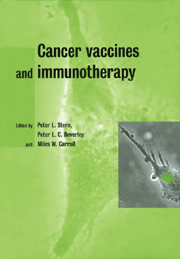Book contents
- Frontmatter
- Contents
- List of contributors
- 1 Immunity and cancer
- 2 Immunotherapy of bladder cancer
- 3 Poxviruses as vectors for cancer immunotherapy
- 4 Vaccinia-based human papillomavirus vaccines in cervical cancer
- 5 Vaccine delivery and immunosuppression in cervical cancer
- 6 Vaccines for colon cancer
- 7 MUC1 vaccines and breast cancer
- 8 Anti-idiotypic vaccination
- 9 Immunotherapy and vaccination against Epstein–Barr virus-associated cancer
- 10 Serologically identified tumour antigens as cancer vaccines
- 11 CTL-defined cancer vaccines in melanoma and other epithelial cancers
- 12 DNA vaccines against B-cell tumours
- 13 Dendritic cell approaches to immunotherapy
- 14 Overview
- 15 Recent developments
- Index
11 - CTL-defined cancer vaccines in melanoma and other epithelial cancers
Published online by Cambridge University Press: 06 January 2010
- Frontmatter
- Contents
- List of contributors
- 1 Immunity and cancer
- 2 Immunotherapy of bladder cancer
- 3 Poxviruses as vectors for cancer immunotherapy
- 4 Vaccinia-based human papillomavirus vaccines in cervical cancer
- 5 Vaccine delivery and immunosuppression in cervical cancer
- 6 Vaccines for colon cancer
- 7 MUC1 vaccines and breast cancer
- 8 Anti-idiotypic vaccination
- 9 Immunotherapy and vaccination against Epstein–Barr virus-associated cancer
- 10 Serologically identified tumour antigens as cancer vaccines
- 11 CTL-defined cancer vaccines in melanoma and other epithelial cancers
- 12 DNA vaccines against B-cell tumours
- 13 Dendritic cell approaches to immunotherapy
- 14 Overview
- 15 Recent developments
- Index
Summary
Introduction
Spontaneous regressions of human tumours have been reported in different types of cancer, especially in melanoma and renal cell carcinoma, but also in other types of cancer, such as nonsmall cell lung cancer, bladder carcinoma and breast cancer. These observations suggest the interaction of the immune system with antigenic determinants presented by the tumour. Early attempts to activate the immune system against tumour growth were based on observations made in cultured melanoma cells which were shown to be lysed by autologous CD8+ T lymphocytes in vitro. The clinical translation of this observation was applied to single patients with metastatic melanoma, who received irradiated autologous tumour cells as a vaccine. Two patients (SK-29 and MZ-2) with recurrent metastatic melanoma have been observed by our group since 1978 and 1982, respectively. Both patients received intradermal immunization with irradiated autologous tumour cells for an extended period of time. Complete regression of tumour manifestations was documented after prolonged immunization with autologous tumour cells. The patients have remained free of disease until now for 19 and 14 years, respectively. Based on these favourable clinical evolutions, a systematic search was initiated to identify and characterize the cancer antigens and immune effector mechanisms mediating these tumour regressions in vivo.
Human tumour antigens recognized by the immune system
Cancer testis antigens
Cytotoxic T lymphocytes (CTL) have been isolated first from melanoma patients that effectively lyse melanoma cells in vitro. Antigenic peptides have been found to be presented by MHC class I and II molecules.
- Type
- Chapter
- Information
- Cancer Vaccines and Immunotherapy , pp. 207 - 217Publisher: Cambridge University PressPrint publication year: 2000



